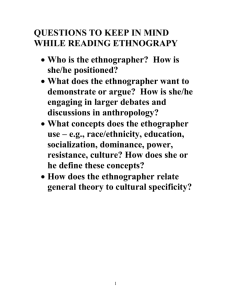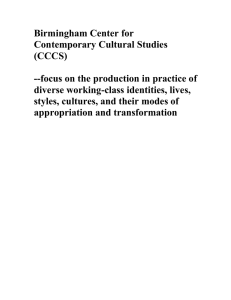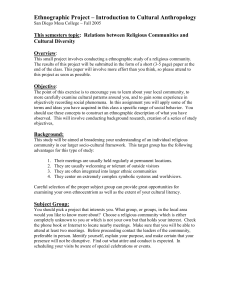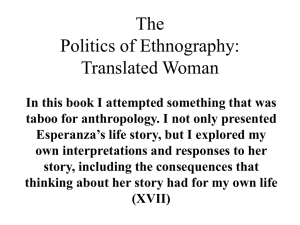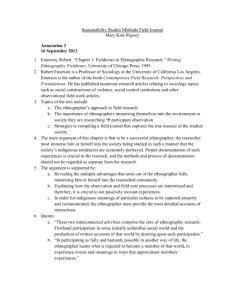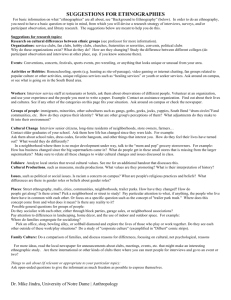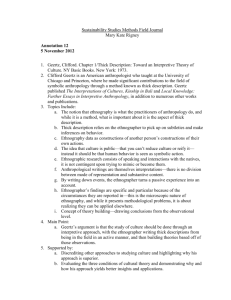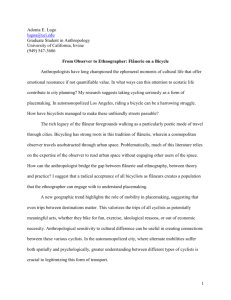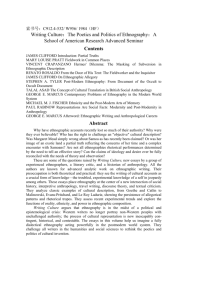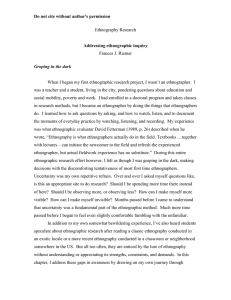Field Study: An inquiry based research project to be
advertisement
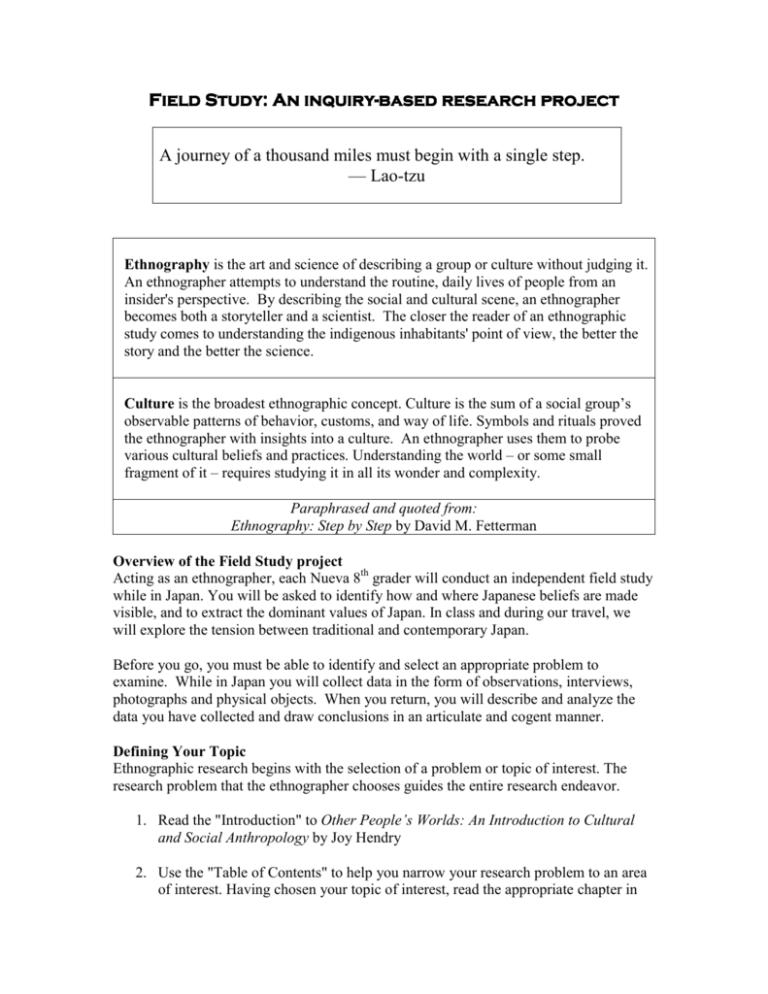
Field Study: An inquiryinquiry-based research project A journey of a thousand miles must begin with a single step. — Lao-tzu Ethnography is the art and science of describing a group or culture without judging it. An ethnographer attempts to understand the routine, daily lives of people from an insider's perspective. By describing the social and cultural scene, an ethnographer becomes both a storyteller and a scientist. The closer the reader of an ethnographic study comes to understanding the indigenous inhabitants' point of view, the better the story and the better the science. Culture is the broadest ethnographic concept. Culture is the sum of a social group’s observable patterns of behavior, customs, and way of life. Symbols and rituals proved the ethnographer with insights into a culture. An ethnographer uses them to probe various cultural beliefs and practices. Understanding the world – or some small fragment of it – requires studying it in all its wonder and complexity. Paraphrased and quoted from: Ethnography: Step by Step by David M. Fetterman Overview of the Field Study project Acting as an ethnographer, each Nueva 8th grader will conduct an independent field study while in Japan. You will be asked to identify how and where Japanese beliefs are made visible, and to extract the dominant values of Japan. In class and during our travel, we will explore the tension between traditional and contemporary Japan. Before you go, you must be able to identify and select an appropriate problem to examine. While in Japan you will collect data in the form of observations, interviews, photographs and physical objects. When you return, you will describe and analyze the data you have collected and draw conclusions in an articulate and cogent manner. Defining Your Topic Ethnographic research begins with the selection of a problem or topic of interest. The research problem that the ethnographer chooses guides the entire research endeavor. 1. Read the "Introduction" to Other People’s Worlds: An Introduction to Cultural and Social Anthropology by Joy Hendry 2. Use the "Table of Contents" to help you narrow your research problem to an area of interest. Having chosen your topic of interest, read the appropriate chapter in Other People’s Worlds. 3. Consider what opportunities you will have to observe and interview people in Japan. (Attached is our itinerary.) For example, during your homestay, you will have the chance to immerse yourself in one family's life. Establish a plan (who, what, where, when, why) for observation. Preparing for a Field Study Ethnographers describe a cultural scene or event in tremendous detail. You can supplement the record of your interactions with people by observing with your senses. The aim is to convey the feel and the facts of an observed event. 4. Observing is one of the most important data gathering techniques of an ethnographer. Before you go, create a form to collect data from your observations. We will discuss various forms and techniques in class as we practice recording observations. Examples of commonly used shorthand symbols: ? $ ♫ ♀ and ♂ You can observe…. Tip of the iceberg: smells, structures, clothes, signs, foods, and music Proxemics, the socially defined distances between people Kinesics, the body language such as gestures, facial expressions 5. Interviewing can explain and put into a larger context what the ethnographer sees and experiences. Work with Yukiko to identify necessary Japanese vocabulary words and compose a series of questions for the interviews. Determine the minimum number of interviews you will conduct. Establish a timetable (who, what, where, when, why) for interviewing. Tools for your project Ethnography requires writing at every stage. You will use pencil and paper to record observations or notes from an interview, and to draw sketches or maps. Your camera can document your field observations. Presentation Upon return from Japan, you will submit your completed field study and report on your findings in an oral presentation to a panel consisting of Cynthia, Yukiko, and Debbie. Your research problem will determine the form of your research report. Research proposals, field notes, memoranda, final reports, and articles or books are some possible products of ethnographic work. Consider your project from the anthropologist’s perspective Culture – a set of shared understandings – is the dominant concept in anthropology. Encounter with another culture intensifies awareness of one’s own cultural identity. This principle explains the anthropologist’s insistence on fieldwork in some alien setting, and it explains his use of comparison between the foreign and the familiar. The fish is the last to understand the water; perhaps he can do so in contrast to the land. Some kind of encounter with another culture is necessary to grasp the power and reality of culture. A major mission and contribution of anthropology has long been, and continues to be, to enhance our awareness of the power and reality of culture in our existence. From: The Anthropological Lens: Harsh Light, Soft Focus by James L. Peacock Your Table of Contents 1. Title Page………………………………………………… p. Title, Author, Date 2. Abstract………………………………………………….. p. A unified, coherent paragraph that explains the main purpose of your research and your conclusion. 3. Interview form(s) and responses………………………… p. 4. Observation form(s) and field notes…………………….. p. 5. Realia and photographs and descriptions……………….. p. 6. Conclusion………………………………………………. p. What values above and below the iceberg does this reveal? 7. Bibliography…………………………………………….. Use http://NoodleTools.com p.
